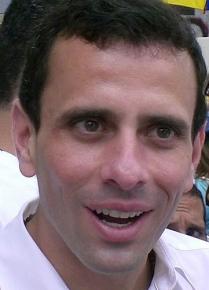A united right-wing challenge to Chávez
reports on the latest maneuvers of the right against Hugo Chávez.
ON FEBRUARY 12, Henrique Capriles Radonski, the governor of Miranda, one of Venezuela's largest states, won a primary election to be the single presidential candidate of the right-wing, U.S.-backed opposition parties challenging left-wing President Hugo Chávez. Radonski won 62 percent of the less than 2.9 million votes cast in the opposition primary out of some 18 million Venezuelans who are eligible to vote.
The presidential election in October is sure to be a bitter campaign as the right-wing opposition to Chávez--complicit in attempted military coups against the democratically elected president, bosses' strikes in the oil industry and other provocative acts--tries to use the deepening economic crisis to push out Chávez once and for all.
Capriles Radonski began his political career in the right-wing Social Christian Party of Venezuela--known as COPEI, by its initials in Spanish, one of the two main parties under the old system that held unchallenged power for decades in the era of the rule of Venezuela's oligarchs, before Chávez won the presidency in 1998 on a platform that promised radical reform.

As Chávez carried out those reforms, the right-wing opposition of Veneuela's former ruling elite, backed by the U.S., struggled organize an alternative. In 2000, Capriles Radonski, along with other young aspiring opposition politicians, formed the Justice First party (PJ).
PJ gained prominence thanks to funds funneled from the U.S. Agency for International Development through the National Endowment for Democracy--and also the International Republican Institute, an organization currently chaired by Arizona Sen. John McCain. PJ's political platform and strategy were designed by Republican Party operatives, according to opponents of the opposition.
From 2000 to 2008, Capriles Radonski served as mayor of the upscale Baruta municipality in eastern Caracas, where he publicly led opposition forces in vandalizing the Cuban embassy during the 2002 coup that removed Chávez from power for 48 hours, until a mass revolt of the country's poor forced his return to power. During the most crucial hours of the coup, Capriles Radonski was an accomplice in the kidnapping and detention of then-Minister of Interior and Justice Ramón Rodríguez Chacín.
DESPITE THIS history, Capriles Radonski, of a socially prominent Venezuelan family involved in the construction industry that owns the largest movie theater chain in Caracas, has proclaimed himself a "progressive" and center-left candidate who will continue Chavez's social programs. At his victory rally, he said, "This is not the hour of the left or the right, but the hour of Venezuela, of all Venezuelans."
The mainstream media in the U.S. and elsewhere is also taking his side. Numerous articles claim Chavez will use a "bonanza of public spending" and the state run-media to tilt the balance against Capriles Radonski.
These articles typically fail to mention that Capriles Radonski's family owns the Capriles media chain, which includes the national newspapers Ultimas Noticias and El Mundo, magazines, a national sports paper, a stake in the Globovision TV network, two radio stations and two online news sites. All were used during Capriles Radonsky's primary candidacy to help catapult him to victory.
Capriles Radonski, who the Venezuelan oligarchy views as their savior, is certainly no democrat nor a champion of the masses. Whatever his rhetoric, he belongs to the most conservative right-wing currents of Latin America's elite. Now he will lead an opposition whose parties have finally united around his candidacy.
Chávez still has strong support from a base he has enjoyed since winning the presidency. In the 2006 presidential elections, he won 7.4 million votes, and there are 5.7 million registered members of his United Socialist Party of Venezuela.
But the Venezuelan economy has suffered as a result of the worldwide economy, despite its huge oil industry that gave Chávez the revenue to carry out his reforms for the poor. And there is more discontent today among Venezuelan workers and the poor against Chávez's highly centralized rule.
Capriles Radonski will attempt to exploit any grievances he can to push Chávez out--but no one should mistake him or the opposition parties he represents as anything other than the political face of Venezuela's old oligarchs, attempting to regain their power and privileges.


